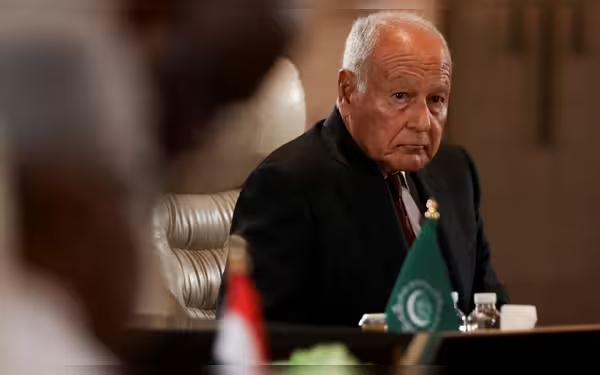Saturday, November 16, 2024 05:46 PM
Arab League Condemns Israeli Attacks on Lebanon Amid Rising Tensions
- Arab League condemns Israeli attacks on Lebanon.
- Tensions escalate following deadly explosions linked to Hezbollah.
- Calls for immediate international intervention and ceasefire.
 Image Credits: arabnewspk
Image Credits: arabnewspkArab League chief condemns Israeli attacks on Lebanon, warns of escalating tensions and calls for international intervention.
In recent days, tensions in the Middle East have escalated significantly, particularly concerning the ongoing conflict between Israel and Lebanon. The Arab League, a regional organization aimed at promoting economic, cultural, and political cooperation among Arab countries, has taken a strong stance against what it describes as "treacherous Israeli attacks" on Lebanon. These attacks have resulted in tragic loss of life, including that of a child, and have left thousands injured, highlighting the urgent need for international attention and intervention.
On Wednesday, Arab League chief Ahmed Aboul Gheit expressed his deep concern over the situation in Lebanon. He condemned the violence that has erupted, particularly following the explosion of paging devices linked to Hezbollah members in both Lebanon and Syria. This incident led to the deaths of 12 individuals and injuries to approximately 2,800 others, marking a significant escalation in hostilities. Aboul Gheit's spokesman, Gamal Roshdy, conveyed the chief's warning about the potential repercussions of this "dangerous escalation against Lebanon and its people."
Aboul Gheit emphasized that the attacks are exacerbated by reckless statements from Israeli leaders, who seem to be intent on widening the conflict on the southern Lebanon front. Such actions pose a serious threat to the stability of the entire region. He expressed unwavering solidarity with Lebanon, its citizens, and its government, urging the United Nations Security Council to take immediate action to address Israel's "continued and reckless" threats to peace and security.
In a related development, Egypt's Foreign Minister Badr Abdelatty reached out to Lebanese Prime Minister Najib Mikati and his counterpart, Abdallah Bou Habib, following the pager blasts. During these discussions, Abdelatty conveyed the directives of President Abdel Fattah El-Sisi, reaffirming Egypt's commitment to supporting Lebanon's security and stability. He stressed the importance of respecting Lebanon's sovereignty and warned against the dangers of escalating tensions that could lead to a broader regional conflict.
Abdelatty's remarks underscored the critical need for immediate measures to prevent further escalation. He called for a ceasefire in the Gaza Strip, an end to Israeli aggression in the West Bank, and the urgent facilitation of humanitarian aid to those affected by the ongoing violence. The situation in southern Lebanon serves as a stark reminder of the fragile state of peace in the region and the potential consequences of unilateral actions that disregard the complexities of the conflict.
As the world watches these developments unfold, it is clear that the path to peace requires concerted efforts from all parties involved. The international community must prioritize dialogue and cooperation to address the underlying issues fueling this conflict. Only through understanding and collaboration can we hope to achieve lasting stability in Lebanon and the broader Middle East.













